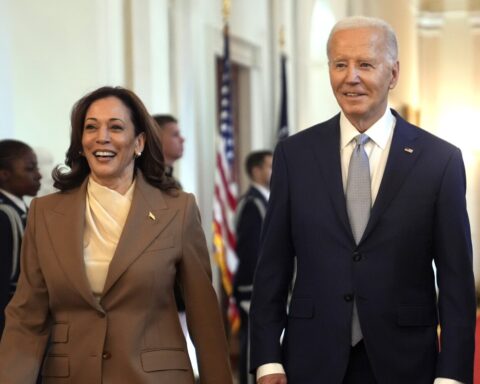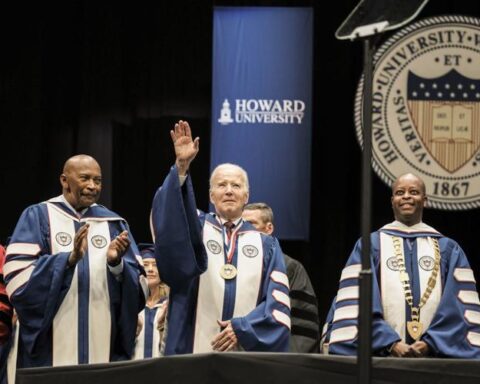Democratic Sen. Joe Manchin dropped the axe on his party’s agenda on Sunday when he said he would not support President Joe Biden’s economic and climate package just as the White House is bracing for another Covid winter that is likely to further sour the nation’s mood heading into a midterm election year.
The West Virginia’s senator’s abrupt move was a sharp break from the White House and it infuriated progressives, who had reluctantly agreed to advance the bipartisan infrastructure deal earlier this year believing that Biden would be able to secure the votes needed to pass the Build Back Better bill in the Senate in short order.
Manchin’s split with his party underscored how the fissures within the Democratic caucus have often paralyzed their effort to deliver for voters. And while some progressives tried to rally their colleagues on Sunday not to lose hope and to press forward with negotiations to fashion the bill in a different form, the debacle illustrated how the loss of one vote in the 50-50 Senate could derail what Democrats have viewed as their best vehicle for creating tangible improvements in voters’ lives before the 2022 elections.
Biden campaigned on the promise that he would be able to build consensus in Congress and end the pandemic, but Manchin’s defection could further undermine voters’ confidence in the President’s ability to lead. The moderate Democratic senator explained Sunday that even after months of prolonged talks with Biden — who he said was “wonderful to work with” — he could not overcome his concerns that the nearly $2 trillion bill would aggravate inflation when Americans are reeling from rising prices everywhere from the grocery store to the gas pump. (Democratic proponents of the bill and White House officials have repeatedly rejected that logic, insisting the legislation would lower inflation over time.)
“I cannot vote to continue with this piece of legislation. I just can’t. I’ve tried everything humanly possible. I can’t get there,” Manchin said on “Fox News Sunday.” “This is a no on this legislation. I have tried everything I know to do,” he said, adding that he could not explain the “mammoth piece of legislation” to constituents in his home state.
White House aides learned about Manchin’s decision from a member of his staff about 30 minutes before his television appearance, CNN reported, and the White House issued an unusually cutting rebuke — personally signed off on by Biden — after what they framed as a reversal of Manchin’s stance in talks with the administration.
White House press secretary Jen Psaki noted that Manchin presented the President with a “written outline” for the Build Back Better bill on Tuesday that was “the same size and scope of the President’s framework,” covering “many of the same priorities” — raising hopes that the two could reach a compromise. She noted that the West Virginia senator had promised to continue talks in the days ahead.
“If his comments on FOX and written statement indicate an end to that effort, they represent a sudden and inexplicable reversal in his position, and a breach of his commitments to the President and the Senator’s colleagues in the House and Senate,” Psaki wrote.
The economic and climate package includes a broad array of programs intended to help American families that Democrats were eager to talk about on the campaign trail next year, even though Republicans have already been attacking them over the size of the bill. It includes universal pre-K for 3- and 4-year-olds, child care assistance, a federally funded paid family and sick leave program and the extension of the enhanced child tax credit for another year. It would also allow Medicare to negotiate the price of certain medications administered in doctors’ offices or purchased at the pharmacy. The bill includes tax increases on corporations and wealthy households in order to raise revenue to pay for new benefits.
Democrats had planned to it using the budget process known as reconciliation, which only requires 51 votes to secure passage, meaning no need for Republican support.
Despite Manchin’s announcement, the Senate will vote on the legislation early next year anyway to allow members to make their positions known, Senate Majority Leader Chuck Schumer announced Monday morning, adding that Democrats will continue efforts to pass a version of the plan.
Sen. Bernie Sanders, an independent who caucuses with Democrats and was managing the package as the Budget Committee Chairman, demanded that Manchin be held accountable to his constituents.
“He’s going to have a lot of explaining to do to the people of West Virginia to tell them why he doesn’t have the guts to take on the drug companies to lower the cost of prescription drugs; why he is not prepared to expand home health care,” Sanders told CNN’s Jake Tapper on “State of the Union” Sunday, reeling off some of the benefits in the bill and how they would have helped impoverished West Virginians.
In another sign of the open warfare within the party, Rep. Pramila Jayapal of Washington state, who chairs the Congressional Progressive Caucus, said in a statement Sunday that Manchin had “betrayed his commitment not only to the President and Democrats in Congress, but most importantly, to the American people.”
“He routinely touts that he is a man of his word, but he can no longer say that. West Virginians, and the country, see clearly who he is,” Jayapal said.
Negotiating from a position of weakness
But Democrats have been negotiating from a weakened hand, counting down the days until midterm elections that are likely to favor the GOP based on historical patterns and the President’s low approval ratings. Republicans have relentlessly targeted the bill as the latest example of profligate spending by Democrats and Biden’s shaky standing in the polls has raised questions about how broad a mandate he holds to make massive changes to the nation’s social safety net.
A Monmouth University poll from early December showed broad support for the Build Back Better plan — with 61% favoring the legislation. But polls have also shown that Americans are uneasy about how Biden’s policies are affecting the economy. Three-quarters of Americans said they were worried about the state of the economy in their own community, according to a CNN poll released last week.
Among the most concerning findings for the White House in CNN’s poll was that only 30% of Americans said Biden’s policies have had a positive impact on economic conditions; 45% said his policies have worsened the economy, and a quarter said they have had no impact. About 8 in 10 said the rising cost of food and other everyday problems were a major problem for the nation’s economy. And consumer price inflation rose by 6.8% in November, a level not seen in 39 years, according to the Bureau of Labor Statistics.
Both White House officials and progressive Democrats have vigorously pushed back on claims from Manchin and Republicans that the bill would increase inflation. The White House on Sunday cited a recent Penn Wharton Budget Institute report that found the legislation would “have virtually no impact on inflation in the short term, and, in the long run, the policies it includes will ease inflationary pressures.”
But that has not stopped Manchin from raising the issue — to the delight of Republicans who have hoped that inflation fears would torpedo the bill.
“Christmas has come early for all the hardworking Texas families that would have been saddled with higher taxes, child care costs, & prices at the pump if Build Back Bankrupt had passed,” tweeted Republican Sen. John Cornyn of Texas, reacting to Manchin’s announcement.
But Manchin’s position led Goldman Sachs to revise its US economic outlook, with the Wall Street firm’s economists stating in a research report that a failure to pass the Build Back Better legislation “has negative growth implications.” The firm now expects GDP to grow at an annualized pace of 2% in the first quarter, down from 3% previously, citing the “apparent demise” of the legislation.
Bracing for a Covid-19 Christmas surge
As he announced his opposition to the Build Back Better bill on Sunday, Manchin said that leaders in Washington should be most focused on the arrival of the Omicron variant, arguing it’s the thing “we should all be directing our attention towards.”
It was a grim reminder for a White House that had hoped to be through the worst of the pandemic by now that things are likely to get worse before they get better, further frustrating already weary Americans as they head into an election year.
Noting how fast cases of the Omicron are doubling, Dr. Anthony Fauci warned on Sunday that the US is headed toward “a tough few weeks to months as we get deeper into the winter.” Only about 61.4% of Americans are fully vaccinated, according to the US Centers for Disease Control and Prevention. And only about 29.5% of them are boosted, which experts say offers the best protection.
The nation’s top infectious disease specialist told Tapper that the rise in cases would significantly strain hospital systems, especially in places with low vaccination rates.
He made another push for Americans to get vaccinated — and if they want to be “optimally protected, get boosted,” he said, while stressing that the nation “can’t walk away” from other mitigation measures like masking and testing.
New CDC data published on Sunday showed that unvaccinated people face a 20-times greater risk of dying from Covid-19 than fully vaccinated people who have also received a booster dose. The data underscored the greater protection that boosters offer: unvaccinated people face a 14 times greater risk of dying from Covid-19 than fully vaccinated people do.
Democratic Sens. Elizabeth Warren of Massachusetts and Cory Booker of New Jersey and Rep. Jason Crow of Colorado all announced on Sunday they had tested positive for Covid-19 after being fully vaccinated and boosted. All three reported mild symptoms.
Still, the rapid rise in Covid cases does not seem to be deterring Americans from their Christmas travel plans. TSA checkpoint data from the end of last week — including Thursday, Friday and Saturday — showed that more than 2 million passengers were screened each day at US airports, a threshold that is nearly double what those figures were a year ago, but still below 2019 pre-pandemic figures.
Biden plans to meet Monday with advisers for a briefing on the latest developments related to the Omicron variant before a speech Tuesday where he plans to issue what the White House described as a “stark warning of what the winter will look like for Americans who choose to remain unvaccinated.”
It will be yet another sobering message the President has to deliver after a year of disappointments for his administration as Americans head into the holiday season.





